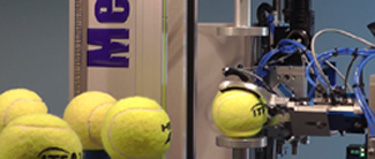Rapid Reproducible Testing Of Tennis Balls
The International Tennis Federation (ITF) has taken delivery of a new automated tennis ball testing system from Mecmesin

Automated Tennis Ball Testing SystemBall manufacturers are required to submit samples of their products to the International Tennis Federation for testing and approval, in accordance with the official Rules of Tennis, to ensure uniformity and consistency in performance during tennis tournaments.
The ITF required a versatile test system that can accommodate “standard” size tennis balls as well as the larger sized, slower foam balls which are designed for use by beginners. Having a long standing relationship with Mecmesin going back 15 years the ITF knew they could rely on Mecmesin’ s expertise in designing and developing a cost effective, yet leading-edge automated testing system to meet their exacting requirements.
Jamie Capel-Davies, Manager, Science & Technical, ITF said, “Mecmesin was our first choice when we decided to upgrade our tennis ball testing system. They provided a bespoke service: meeting our specific requirements and providing a fully-integrated solution. We value their understanding of our business, attention to detail and prompt support.”
By using an automated sample handling system, testing is more reproducible and does not require constant attendance from technicians who are free to perform other duties. The automated system can safely be left unattended to perform all the required tests, and on completion, a comprehensive test report is available with graphical display of the test results.
The system is driven by Mecmesin’s powerful Emperor™ software which has a simple interface, allowing the user to select which tests are to be made from a menu of options. To ensure consistent match performance, samples of the ball are tested by being compressed to a specified load, and the amount of movement measured. This is termed “forward deformation”. The load is then released and the “return deformation” is also found. To make sure each ball behaves uniformly, precision grippers rotate the ball and the test is repeated on three perpendicular axes. In addition, the diameter of the ball and its weight are also recorded. Up to 12 balls can be loaded onto the sample carousel, and when testing is completed, the test report can include pass and fail criteria simplifying the interpretation of the results.
Based around Mecmesin’s MultiTest-i force testing stand, the sophisticated pneumatic ball handling mechanism is capable of locating and positioning the tennis balls on the force testing platform, a weighing scale or the 12 sample carousel.
Results can be stored within the system, or exported to other software applications for secure data storage.
Although this system was built to the requirements of the ITF, Mecmesin’s design can easily be modified for use with many other types of sports balls, including, golf, baseball, cricket, hockey and many more where competition rules dictate specific performance criteria for the ball.
Mecmesin has been producing force and torque measuring equipment, for more than 35 years and has considerable experience in providing bespoke solutions with sophisticated sample handling capability as a stand-alone product or integrated into the customers own manufacturing system.
CONTACT
Jenny Montgomery
Mecmesin Ltd
jenny.marketing@mecmesin.com
www.mecmesin.com
+44 (0) 1403 799979
Thursday 17 January 2013 / file under Engineering | Machinery | Sports



